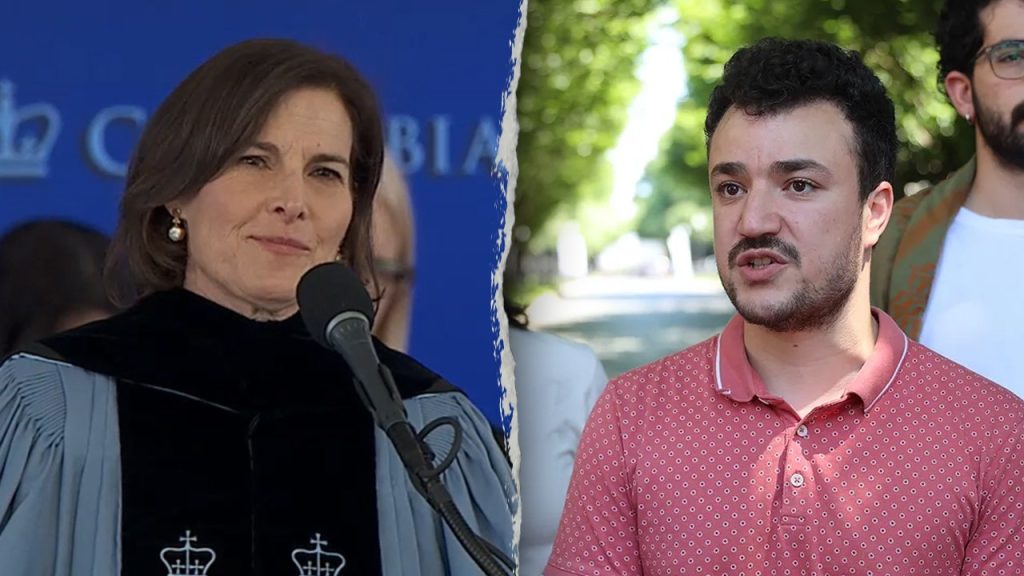Columbia University’s graduation ceremony was marked by significant turmoil as students heckled Acting President Claire Shipman on Tuesday morning, demanding the release of Mahmoud Khalil. This disruption occurred during the Columbia College Class Day ceremony amidst ongoing tensions surrounding recent pro-Palestinian protests on campus. The controversy surrounding Khalil, accused of leading anti-Israel protests, has ignited heated discussions and a polarized environment at the prestigious institution.
| Article Subheadings |
|---|
| 1) Disruption at Graduation Ceremony |
| 2) Background of Mahmoud Khalil |
| 3) Previous Campus Incidents |
| 4) Shipman’s Response to Protests |
| 5) Implications for Columbia University |
Disruption at Graduation Ceremony
During the Columbia College Class Day ceremony, Acting President Claire Shipman faced significant interruptions from students who were vocal in their support for Mahmoud Khalil, shouting phrases like “Free Mahmoud!” as she attempted to deliver her speech. This remarkable outburst occurred shortly after Shipman took the podium, leading to a tense atmosphere as she struggled to complete her remarks amid the heckling.
Shipman had intended to highlight the resilience of the graduating class in facing unprecedented challenges, but her message was largely drowned out by the disruptions. Her attempts to engage the students were met with continued interruptions, forcing her to pause multiple times. As students rallied around their cause, the situation became indicative of broader campus divisions.
Background of Mahmoud Khalil
The chants for Khalil reference his controversial figure within the Columbia community. He has been identified as the alleged ringleader of pro-Palestinian protests, a role that has drawn both support and significant backlash. Media reports indicate that Khalil has been in the spotlight for his outspoken views, which have led to accusations of fostering an unsafe environment for Jewish students on campus.
Court documents have revealed alarming past incidents involving Khalil, where he allegedly made antisemitic remarks, stating intentions to harm individuals based on their ethnicity. These revelations have only added to the complexity of the current situation at Columbia, with students feeling increasingly polarized on the issue.
Previous Campus Incidents
The disruptions at the graduation ceremony are not isolated. Earlier this month, a tumultuous protest unfolded at Butler Library when more than 100 anti-Israel demonstrators stormed the building, leading to injuries among public safety officers and the arrest of several participants. This incident received widespread condemnation from various community leaders, including Shipman, who labeled it “utterly unacceptable.”
During that incident, students who were studying for finals reported feeling unsafe and harassed. The protests specifically called for the university to divest from connections with Israel, intensifying the atmosphere of hostility surrounding discussions pertinent to the conflict in the Middle East. The overwhelming response to the Khalil situation reflects a campus grappling with issues of identity, belonging, and activism.
Shipman’s Response to Protests
In light of the protesting atmosphere on campus, Shipman has made efforts to address the community to quell the rising tensions. Following the library occupation, she issued a statement asserting that such behaviors of violence and vandalism are not representative of Columbia University’s values. She emphasized the need for dialogue and understanding, advocating for community engagement over hostility.
During Tuesday’s ceremony, as students shouted at her, she attempted to maintain composure, suggesting that the conversation must shift towards rebuilding trust and fostering common ground among diverse groups. Her remarks reflected an awareness of the complexities surrounding freedom of expression and the need for cultivating empathy in a charged environment.
Implications for Columbia University
The heated protests and disruptions are symptomatic of larger societal trends regarding activism on college campuses, particularly during this era of heightened awareness surrounding social justice issues. The actions surrounding Khalil are part of a growing narrative that places universities at the center of contentious discussions on both national and international scales.
Columbia University will likely face ongoing scrutiny as it navigates these complexities. The administration’s responses may set a precedent for how institutions handle protests and the rights of students to voice their opinions while maintaining a safe environment for all. Stakeholders will be closely watching how the institution reconciles academic freedom with the reality of increasingly polarized viewpoints.
| No. | Key Points |
|---|---|
| 1 | Students interrupted Columbia University’s graduation ceremony demanding the release of Mahmoud Khalil. |
| 2 | Khalil is a controversial figure accused of leading anti-Israel protests. |
| 3 | Previous protests on campus have resulted in violence and injuries. |
| 4 | Acting President Shipman condemned the disruptive behaviors and called for dialogue. |
| 5 | Columbia faces scrutiny as it navigates issues of free expression and community safety. |
Summary
The events at Columbia University’s graduation ceremony serve as a focal point in ongoing discussions about activism, free speech, and campus safety. The interruption by students calling for the release of Mahmoud Khalil has sparked urgent conversations about the balance between advocacy and maintaining a supportive environment for diverse communities. As Columbia navigates these contentious issues, the implications for its policies and campus culture are profound.
Frequently Asked Questions
Question: Who is Mahmoud Khalil?
Mahmoud Khalil is an activist known for his leadership role in pro-Palestinian protests at Columbia University, which have sparked significant controversy due to allegations of antisemitic remarks.
Question: What triggered the protests during the graduation ceremony?
The protests were triggered by ongoing tensions around Khalil’s arrest and his controversial statements, leading students to demand his release as part of the broader discourse on free expression and activism on campus.
Question: How has the university administration responded to the recent protests?
The university administration, particularly Acting President Shipman, has condemned the violent behaviors associated with protests and emphasized the importance of dialogue and building empathy across divides within the community.



